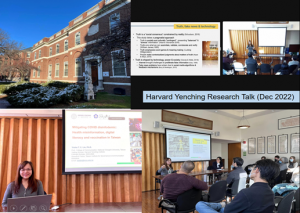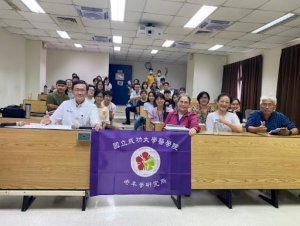In 2014 I read a news article that shocked me. A large semiconductor manufacturer in southern Taiwan was fined a paltry $90,900 for discharging untreated toxic wastewater (hydrochloric acid) into a river, affecting hundreds of acres of farmland and the health and livelihoods of thousands of people. What’s more stunning is that after a second trial the following year, the Taiwan High Court’s Kaohsiung branch reversed the lower court verdict and acquitted four executives and employees of all charges, clearing the company of the fine imposed by the District Court in the first ruling.
How could this happen in an arguably “developed” country? Since I was born in Taiwan, I felt that I couldn’t remain silent or inactive. I was motivated to examine why this might happen and how to prevent it from happening again. I knew I could use what I’ve learned from studying supply chain management to share cutting-edge knowledge about sustainable (green) supply chain management with researchers and business executives in Taiwan.
This Fulbright grant gave me the great opportunity to combine my desire to give back to my native country while also studying something about which I have been curious for a long time: the collective effects of U.S. outsourcing practices on the natural environment at a global level.
My Fulbright research project involved offering seminars to students, faculty, and business managers, visiting companies, interviewing corporate executives, and conducting mail surveys. My biggest challenge was that, compared to their American counterparts, business executives in Taiwan are much less willing to be interviewed without first establishing concrete connections or relationships, due to a need to protect company information. This is understandable because of the fierce competition and the rather small business world of Taiwan. Likewise, conducting mail surveys can be a daunting task as response rate may be low in spite of relentless follow-up phone calls. In short, to conduct empirical research in Taiwan, one must be prepared to go the extra mile and work much harder.
Despite the uphill battle, initial findings suggest that my Fulbright research has been fruitful. Interestingly, I found that in their efforts to go green, besides certain moral motives, manufacturing firms in Taiwan are most strongly driven by (1) compliance to regulations and (2) the desire to avoid poor publicity. They are much less compelled by the demands of shareholders and employees, in stark contrast to supply chain firms in the West where socially responsible investment (SRI) has accrued importance and where signatories to the Principles for Responsible Investment now manage 20 percent of the total value of global capital markets, with estimated assets over $30 trillion. Similarly, while employees have been a key driver for firms to engage in green supply chain practices in the West, employee voices appear to be relatively weak in Taiwan, where employees also have been concerned with lack of raises in salary over the past few years.
On the other hand, as I visited manufacturing firms and interviewed CEOs in Taiwan, I was also heartened to find some “virtuous” companies, such as Everlight Chemical. “Do only the right thing” is the company’s motto, and has guided the firm’s strategy, business development, and practices. Its top management firmly believes that protecting the natural environment and caring for the well-being of people, regardless of whether doing so yields additional economic benefit or not. For instance, the company has developed and followed “product development environmental safety checklists” to avoid the production of harmful materials and to develop eco-friendly and safe products. In one instance, when the chairman of the board learned that an ingredient in one of its popular products could be linked to cancer, he firmly resolved to discontinue the product, although the product accounted for more than 30% of company sales and was still allowed in Taiwan. Furthermore, the firm has established “Environmental Accounting” to analyze products’ environmental impact and costs. Under this practice, new business is declined if the clients’ products are deemed too harmful to the environment. This initiative, again, attests to top management’s strong ethical commitment to sustainability. After all, according to the U.S. Environmental Protection Agency (EPA), “To pursue sustainability is to create and maintain the conditions under which humans and nature can exist in productive harmony to support present and future generations.”
Such companies give me hope for the future of business and the environment, and strengthen my conviction in the global importance of studying green supply chain management.Likewise,I have been thrilled by the enthusiasm about going green that some companies have shown. For example, I was invited by a corporate vice-president to lecture on the topic of green supply chain management (GSCM) immediately following my keynote speech for the Taiwan Industrial Transformation Forum for CEOs, sponsored by the Ministry of Economic Affairs. Situated in southern Taiwan, where the untreated toxic wastewater incident has attracted national and international media attention, this company is determined to do just the opposite by fulfilling its corporate social responsibility (CSR) and implementing green supply chain management. As I entered the spacious corporate conference room, I was pleasantly surprised by the voluntary attendance of nearly one hundred middle and senior management members and employees who were ready to take notes, raise questions, and engage in discussions.
During my stay in Taiwan, I realized that U.S. companies that outsource manufacturing to Asia also “outsource” pollution. Interestingly, developed countries often blame developing economies for global pollution, whereas developing economies counter that pollution is caused in the course of producing goods largely for consumption in developed countries. In any event, many pollutants travel huge distances across the Pacific back to the U.S. on global winds. To address these global issues, I also worked to convince professors in China to study how to best motivate or encourage Chinese companies to practice green supply chain management so as to minimize their environmental impact. With my input and guidance, that stream of research has gotten under way and borne fruit. Having collaborated with researchers in my Taiwanese host institution, my U.S. home institution, and other institutions in third countries (e.g., in Germany and U.K.), I plan to lead a comparative study on green supply chain implementation in developed and emerging countries.
I feel that the planet would have been better off if the West had not outsourced manufacturing to Asian countries over the past few decades. This is because environmental regulations and, more importantly, their enforcement, have been lax in emerging economies where environmental protection is usually kept weak in the name of economic development or gross domestic product (GDP). As a result, more particulates and other harmful materials have been emitted into Earth’s atmosphere. Thus, as a whole, the Earth and the biosphere have suffered from growing pollution because of outsourcing practices.
This Fulbright project is expected to make at least three lasting contributions. First, it will yield a better understanding of what motivates or impedes manufacturing firms in Taiwan and China to go green, which can benefit not only these two countries but also the U.S., since improving green practices in East Asia will allow less pollutants travel across the Pacific to the U.S. Second, stimulating scholars to engage in green supply chain management (GSCM) research helps make GSCM practices in the region more sustainable as local researchers continue to gain insights into how firms can improve their environmental and economic performance from GSCM implementation. Finally, this research has implications for policymakers responsible for developing rules and regulations for regional or transnational trade agreements.
In this age of outsourcing and sustainability awareness, business corporations are increasingly held responsible for their supply chain operations. Brand owners, usually large Western multinational corporations, may react to stakeholder pressures by engaging in self-interested behavior, transferring the responsibility to their supply chain partners, usually suppliers in emerging countries. If multinationals are unwilling to share the added cost of sustainability practices, however, suppliers will generally be reluctant to commit. My coauthor Antony Paulraj and I have long preached that the essence of supply chain management is to manage a network of interdependent relationships developed and fostered through strategic collaboration with the goal of deriving mutual benefits (Chen and Paulraj, 2004). When buyers use coercive power without distributive justice, suppliers may behave opportunistically and the pollutants may travel back to the U.S. on global winds. The time is ripe for Conscious Capitalism. This Fulbright research finding is a good reminder for multinational supply chain organizations that “If you want to go fast, go alone, if you want to go far, go together.”







